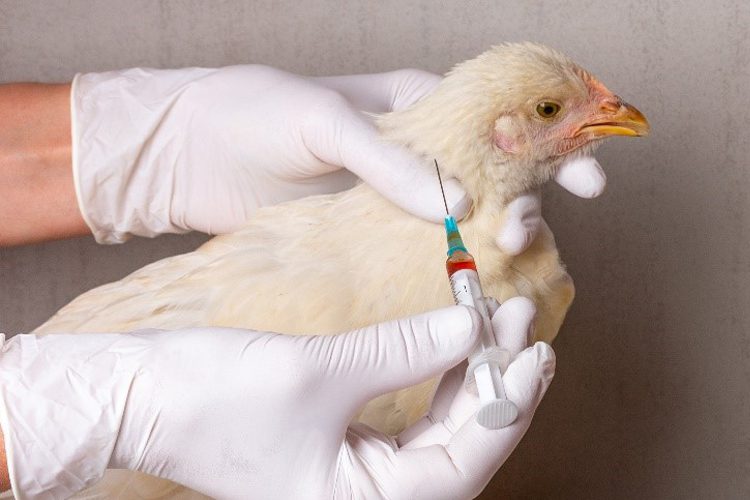ST LOUIS, Mo., Sept. 16. — At the Joint agInnovation and Extension Awards Ceremony, Dr. Chris Ashwell and Dr. Jason Hubbart received the 2025 Excellence in Multistate Research Award on behalf of a multistate team working to understand the genetic bases of immunity and resistance to avian diseases.
Avian diseases such as avian influenza, Marek’s disease, and Newcastle disease cause serious economic losses each year and can pose health risks for other animals, including humans. Active since 1968, this project has made significant advances that support a sustainable poultry industry in which poultry are healthy, producers are confident, competitive, and profitable, and consumers have a reliable supply of safe, high-quality poultry products. This award, which is given annually by agInnovation (a national organization that supports research administrators in colleges of agriculture), celebrates the project’s 57-year legacy of collaboration innovation and impact and recognizes the project’s recent outstanding achievements.
The multistate approach has been key to this success. Led by researchers at land-grant universities across the U.S. and supported by collaborators from the poultry industry, government agencies, and other institutions worldwide, this project has been able to continually adapt to emerging avian disease threats, integrate cutting-edge technologies, and respond to stakeholder needs. Long-term coordination allows project members to distribute the workload, reduce redundancy, and share expertise, tools, data, and other resources. For example, no state or institution has the range of facilities, equipment, and biological resources (like specialized genetic stocks, antibodies, and pathogen stocks) needed for avian disease research. Under this project’s structure, multiple institutions have worked together to develop and maintain poultry breeding lines with defined genetic characteristics. These stocks have enabled multiple discoveries in the areas of immune response and disease resistance.
Identification of critical immune response genes has directly informed vaccine development. For example, project members discovered, developed, and patented the principal component of the Marek’s disease vaccines now used by virtually all poultry companies globally. Research on poultry immune response to Salmonella and Campylobacter—common causes of human foodborne illness—has the potential to significantly enhance food safety. Studies on the genes and mechanisms associated with resistance to heat stress will help breed poultry that are better adapted for challenging environmental conditions. Researchers have also identified feed amendments that could augment poultry immune responses, especially when conventional antibiotics are not effective.
Project members regularly share their findings, tools, and methods with producers, breeders, vaccine developers, veterinarians, and other stakeholders. In addition to book chapters, technical reports, and outreach materials, researchers have published at least 1,125 articles in high-impact journals. Twenty-five percent of those articles are co-authored by project members from multiple institutions, demonstrating the project’s longstanding commitment to collaboration.
The economic impacts of this project are substantial. Poultry companies worldwide have integrated project findings and tools, such as genetic screening tools and vaccines into their breeding programs and flock management protocols. In addition to reducing flock losses, advances in disease resistance and immunity have helped producers reduce reliance on expensive antibiotics. With total U.S. poultry production value reaching $151.6 billion in 2022, even a conservative estimate of 1% improvement attributed to this project represents $1.5 billion in added value. The global influence is likely even more extensive.
The Excellence in Multistate Research Award not only recognizes this committee’s work so far but will also support future impacts. The project will receive $15,000 from the Hatch Multistate Research Fund to support their ongoing objectives.
Project Funding & Participation
This project, NE2334: Avian Disease Resistance and Immunity (2023-2028), is supported in part by USDA NIFA through Hatch Multistate Research Fund allocations to participating State Agricultural Experiment Stations at land-grant universities and other partners. Current participants include: University of Arkansas, Auburn University, University of California, Davis, University of Delaware, University of Georgia, University of Illinois, Iowa State University, University of Maryland, North Carolina State University, The Ohio State University, West Virginia University, Western University, and the USDA-ARS, Athens. Current collaborators include: USDA-ARS, College Station, Cotter Laboratory, and Hy-Line International. Current international collaborators include: Agriculture Canada, McGill University, University of Prince Edward Island, Ontario Veterinary College, University of Aarhus, University of Ghana, International Livestock Research Institute, Wageningen University, Roslin Institute, University of Edinburgh, Sokoine University of Agriculture. Previous and future iterations of this project may include other participants and partners. Project members have successfully secured substantial funding from a diverse range of additional sources to support and expand their research. Project and participant details: https://nimss.org/projects/19036.

NE2334 project members at a recent annual meeting. Photo courtesy of Dr. Ali Nazmi, The Ohio State University.
Contact: Sara Delheimer, Coordinator/Writer, agInnovation Multistate Research Fund Impacts Program; Dr. Andrew Broadbent, NE2334 Technical Committee Chair; Dr. Robert Taylor, NE2334 Administrative Advisor
More From: ResearchShare this Post

